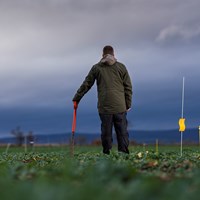WWF is the world’s leading independent conservation organisation working to ensure that people and nature can thrive together for generations. WWF Scotland has led the call for a low carbon future for Scotland for almost two decades, proposing, alongside ambitious emissions reduction targets, policies that will transform sectors of our economy, bringing opportunities for renewed investment and job creation. It is vital that we have a just transition to net zero, where the many benefits of climate action are widely shared, and where the costs of the transition are not disproportionately borne by those least able to shoulder them.
The customer challenge
Agricultural and Land Use Policy Manager at WWF Scotland, Ruth Taylor was the lead on the project. WWF Scotland work on a range of evidence-based advocacy to influence legislation and regulatory activity in Scotland to tackle climate change and nature loss. In Scotland, 75% of land-use is agricultural. As such, WWF Scotland planned to undertake research which would help to guide the development of agricultural policy in the Scottish Parliament and support the drive to tackle the climate and nature emergency.
SAC Consulting won a tender to support them in their research project, which investigates farmers’ experiences of extreme weather events and whether alternative agricultural practices can support farm resilience and profitability for the future.
Our solutions
To deliver the project set by WWF Scotland, the following activities were undertaken:
- Farmer case studies: Three farmers were interviewed to discuss their specific approaches to nature-friendly or regenerative farming approaches and discuss how they felt this had (or had not) influenced their resilience to weather events.
- Economic impact assessment: SRUC’s dynamic farm-level economic model ‘ScotFarm’ was used to look at the impact of different weather scenarios on net farm profit across different enterprise types. ‘ScotFarm’ is a dynamic linear programming (LP) model which optimises farm margins within a few limiting farm resources.
The outputs of this project highlight that farmers are being affected by weather events, such as increased rainfall mostly in a negative way. Understanding the underlying factors controlling the degree to which farmers are affected by different weather events is complex due to many interlinking factors such as geographical location, land use history, farm type, management practices and personal attitudes.
However, there are common concerns regarding the future of UK agriculture in relation to international, political, governmental, and societal pressures. A common concern is ensuring farmers receive a fair price for
their products to ensure a viable business is possible and sustainable.
Survey outputs demonstrate a willingness by the farming community to farm more sustainably and the drivers to changing farm business practices and moving to different methods of production in support of more
sustainable solutions go beyond altruism. Better soil health, improved biodiversity, measurable carbon management, and ultimately, greater business viability and longevity are vital factors in the process.
The result of this study provides qualitative evidence that making changes to land management practices can positively impact the productivity and resilience of farms as they support the drive towards more sustainable solutions and net-zero for the climate and nature emergency.
Added value for WWF Scotland
The scope required refinement part-way through the project, but the team worked to change the parameters,
offering expertise in understanding the data and how to use it to answer the key questions. Ruth found the SAC Consulting team to be approachable, expert, and willing to adapt to ensure the outcome met the changing needs of the project
Testimonial:
“We know that climate change is going to make extreme weather events even more likely. This is all happening in the context of a changing policy and market environment, and policy needs to keep up with these changes. Using real-life examples to show the views of farmers. Using data to talk to the public, politicians, and decision-makers about these challenges helped show that the issues we’re talking about are
happening now and impacting people all around us.
SAC Consulting has a good reputation and strong brand recognition. Their experts bring a uniquely research-driven approach and includes useful technical insight, as well as an important understanding of the Scottish dimension of these issues, which is what gives SAC Consulting an edge on delivery in this project.”
Ruth Taylor
Agricultural and Land-Use Policy Manager,
WWF Scotland
Links:


